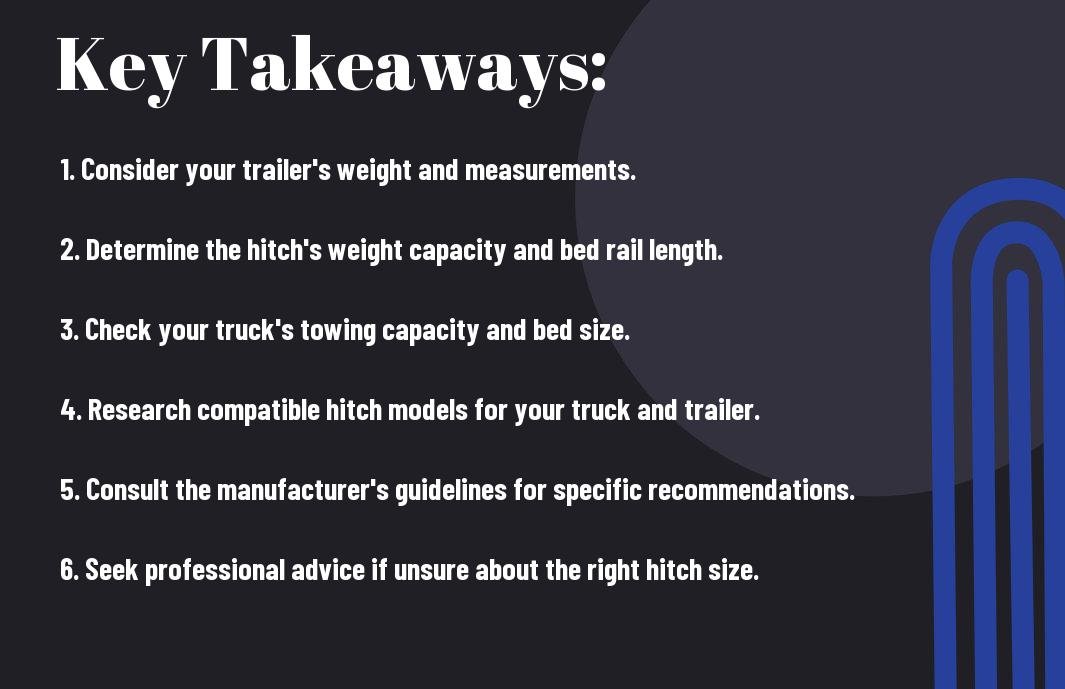When it comes to towing a 5th wheel trailer, choosing the right hitch size is crucial for a safe and secure journey. Choosing the wrong size hitch can result in instability, poor weight distribution, and even potential accidents on the road. So, how do you determine the correct size 5th wheel hitch for your vehicle and trailer? First and foremost, you need to consider the weight of your trailer and the towing capacity of your vehicle. It’s important to carefully calculate the gross trailer weight, pin weight, and the overall towing capacity of your vehicle to ensure a suitable match. Additionally, you must also take into account the height of your truck bed, as it will affect the size and compatibility of the 5th wheel hitch. By carefully evaluating these factors, you can confidently determine the appropriate size 5th wheel hitch for your towing needs.
Key Takeaways:
- Understand your towing capacity: Knowing your vehicle’s towing capacity is crucial in determining the size of the 5th wheel hitch you need.
- Consider the weight of your trailer: The weight of your trailer will impact the size and class of the 5th wheel hitch required for safe towing.
- Choose the right bed type: Ensure that you select a 5th wheel hitch that is compatible with your truck’s bed type (short bed or long bed).
- Know the 5th wheel hitch classes: Familiarize yourself with the different classes of 5th wheel hitches (such as Class 1 to Class 5) and select the appropriate one for your setup.
- Consider the installation process: Take into account the ease of installation and compatibility with your truck when determining the size of the 5th wheel hitch you need.
- Consult with a professional: If you are uncertain about what size 5th wheel hitch you need, seek advice from a reputable professional or a knowledgeable dealer.
- Invest in quality and safety: Prioritize safety and quality when selecting a 5th wheel hitch, as this will ensure a smoother and safer towing experience.

Assessing Your Towing Vehicle
Obviously, one of the most important factors to consider when determining the size of 5th wheel hitch you need is the towing capacity and compatibility of your vehicle. Assessing your towing vehicle will ensure you choose the right hitch for safe and efficient towing. Here are a few things to consider.
Vehicle Towing Capacity and Ratings
When assessing your towing vehicle, it’s crucial to understand your vehicle’s towing capacity. This is the maximum weight your vehicle can safely tow. Exceeding this limit can not only damage your vehicle, but it can also pose a serious safety risk. You should also consider the Gross Combined Weight Rating (GCWR) and the tongue weight capacity. Exceeding any of these ratings can put a strain on your vehicle and lead to dangerous towing conditions. Make sure you know these ratings for your specific vehicle before choosing a 5th wheel hitch.
Compatibility with Your Truck Bed
Another important aspect to consider is the compatibility of the 5th wheel hitch with your truck bed. The hitch must be properly sized to fit your truck bed and allow for safe and secure towing. The last thing you want is to have a hitch that doesn’t properly fit, leading to instability and potential accidents on the road. Additionally, you’ll want to consider the rail system in your truck bed and whether it is compatible with the mounting system of the 5th wheel hitch. Ensuring compatibility with your truck bed is crucial for a smooth and safe towing experience.
Knowing Your 5th Wheel Trailer
Unlike conventional travel trailers, 5th wheel trailers are unique in the way they connect to the towing vehicle. They have a specialized hitch that mounts in the bed of a pickup truck, providing greater stability and maneuverability compared to other types of trailers.
Trailer Weight and Hitch Weight
When it comes to selecting the right 5th wheel hitch size, understanding the weight of your trailer and the hitch weight is crucial. The trailer weight refers to the total weight of the loaded trailer, while the hitch weight is the downward force exerted on the hitch by the trailer. Knowing these two factors will help you determine the appropriate size of the hitch to safely tow your 5th wheel trailer.
Types of 5th Wheel Hitches
There are several types of 5th wheel hitches available, each with its own set of features and capabilities. The most common types include fixed position hitches, sliding hitches, and gooseneck hitches. Fixed position hitches are stationary and ideal for towing in a straight line, while sliding hitches are designed for short bed trucks to provide additional maneuverability. Gooseneck hitches offer a different connection point and are often used for heavy-duty towing. Knowing the differences between these types will help you make an informed decision on the best 5th wheel hitch option for your specific towing needs.
| Type | Description |
|---|---|
| Fixed Position Hitches | Stationary hitches ideal for straight line towing. |
| Sliding Hitches | Designed for short bed trucks to provide additional maneuverability. |
| Gooseneck Hitches | Offer a different connection point and are often used for heavy-duty towing. |
Selection Criteria for 5th Wheel Hitches
When it comes to selecting the right 5th wheel hitch for your towing needs, there are a few important factors that you should consider. Not all hitches are created equal, and it’s crucial to choose one that is suitable for your specific towing setup. In this chapter, we will discuss the key criteria that you should keep in mind when selecting a 5th wheel hitch for your vehicle.
Hitch Weight Rating (HWR)
The Hitch Weight Rating (HWR) is a critical factor that you must consider when selecting a 5th wheel hitch. The HWR refers to the maximum amount of weight that the hitch can handle. It is crucial that you do not exceed this weight limit, as doing so can lead to dangerous towing conditions and potential damage to your vehicle. When determining the appropriate HWR for your 5th wheel hitch, you should take into account the total weight of your trailer when fully loaded, as well as any additional cargo that you may be carrying. It’s always better to choose a hitch with a higher HWR than you think you’ll need, to ensure that you have a safety margin for unexpected weight increases.
Determining the Suitable Hitch Type
Another important consideration when selecting a 5th wheel hitch is determining the suitable hitch type for your towing setup. There are different types of 5th wheel hitches available, including fixed position hitches and sliding hitches. The type of hitch you choose will depend on various factors, including the size of your truck bed, the maneuverability you require while towing, and the weight distribution of your trailer. It’s essential to carefully evaluate your specific towing needs and choose the hitch type that best meets your requirements.
Installation and Safety Considerations
After determining the size of the 5th wheel hitch you need, the next step is to install it properly and ensure that you follow necessary safety considerations. Here’s what you need to know.
Professional Installation vs. DIY
When it comes to installing your 5th wheel hitch, you have the option of hiring a professional to do the job or taking on the task yourself. While a professional installation may cost you some extra money, it ensures that the hitch is installed correctly and safely. However, if you have experience with similar installations and the necessary tools, you may choose to tackle the installation yourself. Just remember that the hitch must be securely attached to your vehicle to prevent any accidents or damage.
Towing Safety Tips
When it comes to towing a 5th wheel trailer, safety should always be your top priority. Before hitting the road, make sure your vehicle and hitch are properly equipped for the load you will be towing. Always double-check that the hitch is locked and secured, and that the safety chains are properly attached. Additionally, always distribute the load evenly and ensure that your trailer brakes are in good working condition. Recognizing and respecting weight limits for your vehicle and hitch is crucial for safe towing.
- Inspect your equipment regularly to ensure proper functioning
- Secure loose items in your trailer to prevent shifting during transit
- Practice safe driving habits while towing, such as avoiding sudden stops and starts
How do I know what size 5th wheel hitch I need?
On the whole, choosing the right size 5th wheel hitch is crucial to ensure a safe and secure towing experience. To determine the correct size, you need to consider factors such as your trailer weight, the capacity of your truck, and the type of hitch mounting system you have. It is important to consult your vehicle’s owner’s manual or a professional to ensure you are selecting the appropriate size for your specific towing needs. By taking these factors into account, you can confidently select the right size 5th wheel hitch for your towing setup.
FAQ
Q: How do I know what size 5th wheel hitch I need?
A: The size of the 5th wheel hitch you need depends on the towing capacity of your truck and the weight of the trailer. It is important to consult your truck’s owner’s manual and the trailer’s specifications to ensure that you select the appropriate size hitch.
Q: What is the towing capacity of my truck?
A: The towing capacity of your truck can typically be found in the owner’s manual or by contacting the manufacturer. It is important to know this information before selecting a 5th wheel hitch to ensure that it can safely handle the weight of the trailer.
Q: How do I determine the weight of the trailer?
A: The weight of the trailer, also known as the GVWR (Gross Vehicle Weight Rating), can usually be found on a label on the trailer or in the owner’s manual. It is important to account for the fully loaded weight of the trailer, including all cargo and supplies.
Q: What happens if I choose a 5th wheel hitch that is too small for my trailer?
A: Choosing a hitch that is too small for your trailer can result in dangerous towing conditions, including swaying, loss of control, and potential damage to both the trailer and the vehicle. It is crucial to select a hitch that can safely handle the weight of the trailer.
Q: Are there different types of 5th wheel hitches based on size?
A: Yes, there are different types of 5th wheel hitches based on size, including fixed-position hitches, sliding hitches for short-bed trucks, and adjustable hitches for varying trailer heights. It is important to select the correct type of hitch in addition to the appropriate size.
